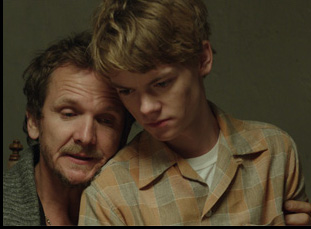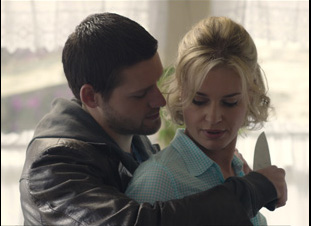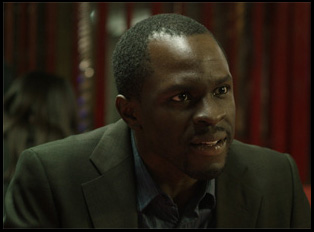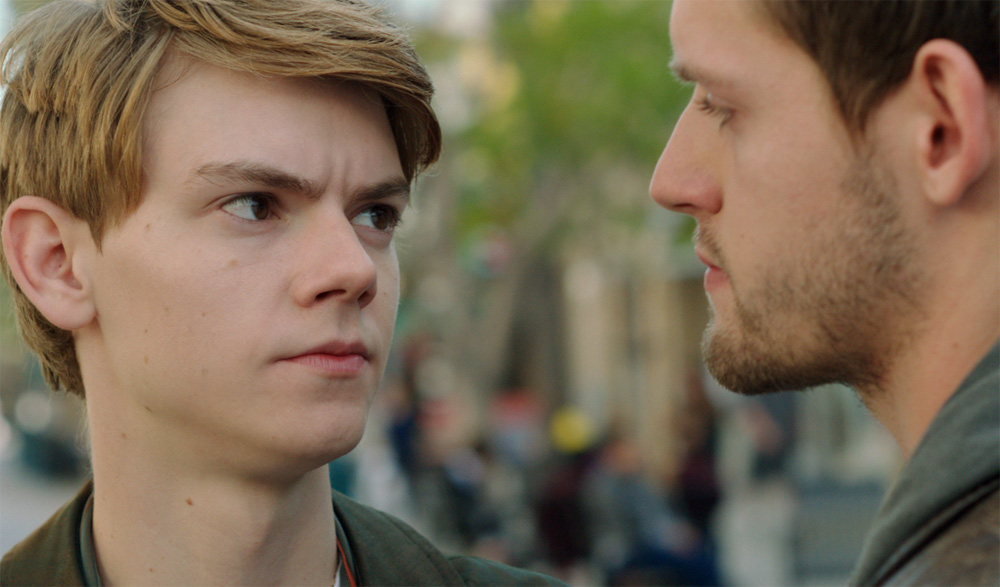Musically, there’s a bit of everything in “Sleep No More,” an apt reflection of the city it takes place in – Los Angeles – where the Delta Blues can feel right for its uncomfortably hot summer days and the aching guitars of alternative rock seem like an echo of the skate scene, though neither was what writer/director Antonia Bogdanovich was most excited about putting on the soundtrack.
“I’m a bit of a hip hop geek, and have been since I was very, very young, so if there’s a place I can put my favorite music on the planet, I will,” says Bogdanovich, who naturally waited for her characters to start living large before throwing some rap into the mix.
Given the last name, you might be surprised that this is the case when none of these tracks would be what one would associate with the films of Antonia’s father Peter Bogdanovich and her mother Polly Platt in their collaborations together such as “The Last Picture Show,” “What’s Up Doc?” and “Paper Moon” or separately after an acrimonious parting when Platt built her own legend as a production designer and producing partner for James L. Brooks. However, they feel entirely true to where Bogdanovich was coming from in both a literal and narrative sense in her feature debut, titled “Phantom Halo” upon its initial release in 2014 and rechristened now as a nod to its Shakespearean roots in a version that’s been recut to reflect her true intentions.
There is a bit of poetry beyond what can be measured in iambic pentameter in Bogdanovich taking a second crack at the film, which saw its initial distributor go belly up in the lead up to its release, crippling its chances of finding an audience. When her father had recut several of his own works, the film may bear his influence in one respect, but she reveals a distinctive voice otherwise as it tells the story of two brothers, curiously named Samuel (Thomas Brodie-Sangster) and Beckett (Luke Kleintank), who bear the burden of keeping a roof over their head when their father Warren (Sebastian Roché) is bound to booze it up if not getting lost in fantasies of a former life shared with their now-deceased mother and dreams of a career in the arts that never coalesced. Samuel can’t entirely enjoy performing either when he’s entirely dependent upon it for income, reciting “Macbeth” on Santa Monica’s Third Street Promenade as Beckett sneaks around the crowds he draws collecting more money than they’re willing to toss into his brother’s hat as a pickpocket. Always after a larger score, Beckett learns of a printing press that could be used to literally print money, but in solving a crisis for his family, he threatens to lose himself in a sea of shady underground characters.
As Beckett starts to become unrecognizable even to himself, “Sleep No More” considers a host of Angelenos desperate to be known for who they are rather than what they appear to be to one another, from Samuel who would love to unburden himself of adult responsibilities to spend more time as a kid, enjoying comic books including his favorite superhero, the Phantom Halo, to Ms. Rose (Rebecca Romijn), a disillusioned ingenue who no longer has to spend time in her empty pool alone when Beckett befriends her son as part of his scheme. Beyond its central story of brothers who are left without a father and eventually each other to look to as role models before developing identities of their own, it becomes especially poignant to see Bogdanovich step out of the shadow of her famous family and demonstrate a strong voice of her own. With the film now back in circulation on VOD, she graciously took the time to talk about getting a second chance at her debut feature, what went into taking the leap as a director in the first place and taking the rough edges of a fractious city and a family and piecing together a mosaic that makes sense of them.

Well, my dad passed away in January 2022 and he’s had hard times and I’ve had hard times. It’s not easy to be a film director, and he was a big supporter of me and my work. He was very truthful, just like Warren in the movie, like if you’re not good, he was going to tell you, but he said, “Never give up on your talent.” So I just thought it was 10th anniversary and I really wanted to change a few things in the ending and in the middle, so I just thought it would be a great opportunity to get it back out and introduce it to basically a new audience.
Your father actually released director’s cuts for nearly all of his films. Was that actually an ethos he imparted at all – the idea that the original release may not be the final one for the film?
Absolutely. And it’s funny because his team and myself are working on a director’s cut of “Squirrels to the Nuts,” which is weird because that was happening before he passed, and [the idea to revive “Sleep No More”] came about about a year-and-a-half ago. But if you even put a script aside for two or three weeks or even six months or a year, you completely grow as a person. We all experience things. I’m a totally different person than I was when I wrote “Phantom Halo.” My mother had only died a few years before and I’ve been through a divorce. There’s so much that you experience, so when I revisit a script, I always have to rewrite it and sometimes I’m like, “How could I write that [in the first place]?” Same with a film. I always wished I had done a few things differently and to a certain extent, you can’t rewrite the script [at that point], but you can change things in the edit that really change the pace of the film and how the audience responds to it emotionally.
You can really feel that this is personal even though the story is clearly far removed when you actually include a picture of your mother in one scene as the matriarch of this family who is no longer around. Were you ever surprised by how personal this may have been, looking back?
This is a personal story, even though it’s set in crime and there are a couple of reasons for that – my two closest friends in high school robbed my mother’s house and I didn’t find out for a year. They went into people’s homes and I thought they were just the cool bad boys and I never thought it would kick back on me, so that really affected me. Then just the idea of what is in a criminal’s mind, like are they desperate? Are they sociopathic? Many of them are not. Then of course, [there was] the loss of a parent in a home. My dad left and I saw him quite a bit, but my mother pretty much raised me. And when you’re [in the middle of] making a movie, you don’t really think about what you’re doing. There’s a perspective you have to have and the first time I looked at the film after about six months to a year [after making it], and at the ending ending, I was like, “Oh my God, I killed off both my parents.” Metaphorically speaking, I think if you have parents that have done great things that you respect and honor and learn from, you have to eventually get them out of your head and you have to become your own unique individual, so [I realized] maybe that’s why I had to make this movie first.
Of course, now that they’re both gone, I draw from their wisdom in life, but in cinema all the time. Like all the little things my mother would say to me when we were watching movies in the theater from the time I was little, she was either commenting on a performance or particularly when I was younger, production design, which I think really has an impact on a movie. And I only have that perspective because my mother was a production designer.

Oh, absolutely. It never occurred to me that I was going to be a film director. That was the last thing. I was a writer for years and years. I didn’t necessarily try to get my screenplays made, but I wrote them. They were the easiest thing for me to write and then I did journalism and I tried to write a novel, but I discovered that screenwriting was where I really could excel. And somebody who was the head of development for J.J. Abrams at the time [of “Sleep No More”] called me after reading a script and said, “Have you ever considered directing?” This was 2010 and I said, “I’ve directed some theater, but no. Why are you asking?” And she said, “Because your script reads like a director wrote it. Everything’s so vivid.” And I said, “Well, aren’t all scripts written like that?” And she laughed, and I really respected this woman and I really respect J.J., I’ve known him forever, so I went out and did a short. And then I was like, “Oh, duh, I’m a film director.” It just never occurred to me when I was younger.
You can really tell, especially when it has such a distinctive approach to capturing Los Angeles in a way that’s really accurate of having these worlds collide into one another.
Well, this is my hometown, born in Hollywood and moved to Santa Monica. I left for many years, but I’m back now, and it is such a part of my identity, not only because I experienced my dad making movies and we went to Sony and to Paramount, but then I rebelled against that. Once I became a teenager, I was very troubled and Venice and South Side Santa Monica weren’t good neighborhoods. My friends were all artists and skaters, but they were rebellious [too], so that’s what I fed into and I had a boyfriend that was from Watts. My parents were very liberal and open, so there wasn’t any judgment, but I just really rebelled against my Hollywood upbringing and continued to do that for quite a while until I decided, look, you have to embrace both sides — the side that you explored when you were a teenager and wanting to be different and separate myself from my father, even though we’re quite alike in many ways.
And I used to hate the dirt and the grime in L.A. when I wanted to leave, but now I feel this is just part of when you grow up here. Sometimes you can disassociate from it and other times you can see the beauty in the dirt and the grime. And that’s how I looked at Sam and Beckett [in “Sleep No More”], they’re at their lowest, but they can go to the promenade and go into a fantasy where there are other people, so from the start, I wanted to make L.A. part of the story.
And of course, the brothers’ names are Sam and Beckett and they pull off their pickpocketing scheme while Sam performs Shakespeare. It gets at a really interesting idea of high and low culture co-exisiting. Was that tension always at the core of this?
From a public point of view, my family seemed great and idyllic, but there was divorce, murder, death, cheating, lies — there was just a lot going on, even though my parents loved me and I loved them. We were really close. Still, there was a lot of drama and for me personally, the comic books in the movie are really television. I wasn’t allowed to watch TV. TV was frowned upon by my father basically until “The Sopranos” — and he ended up being an actor [in it]. He was really like, “Movies, classical music, Louis Armstrong, and that’s pretty much it.” And he loved Bruce Springsteen. Meanwhile, I loved everything, “Star Wars,” I was engulfed in the culture, but I just didn’t grow up with TV. And if I liked TV, I had bad taste. My mother didn’t really like TV, either. So [in “Sleep No More”] the comic book is this idea of having to escape, and my little boy loved comic books, and he was really little when I wrote [“Sleep No More”] and he was so into superheroes, so I thought, why not?
I thought [Sam] believes if he can become a superhero, he can get away from his father and get away from this life, and he’s already Shakespearean. He’s living in a different time and for me, Shakespeare was just the golden age of Hollywood. My parents didn’t really encourage me or force me to read Shakespeare. But I saw a few plays when I was 12 or 13, and I just was obsessed. Whenever I was in London, I would see some play and of course, the dark ones are my favorites. A lot of [this film] comes from “Henry IV,” part two, and this idea of Flagstaff. He’s a prince, but he’s hanging with [the wrong crowd]. I did that for years, and it got me in a lot of trouble, but it also taught me a lot about life.

We shot in December and November, so weirdly enough, it wasn’t that crowded and the Promenade has become less and less popular. Anybody that was walking by, we would just use them in the shot and wasn’t as bad as I thought. It was the most expensive location that we paid for, besides the casino in Gardena. We used a real one and that was expensive.
You also create a great location with that empty pool…
It’s crazy. We emptied that pool. My line producer Kristen Trattner, who was also the production manager, she’s a person you want on every single one of your movies. She’d figure it out. She’s like, “Yeah, it’ll take us two days to drain the pool” and it was insane. That was so fun. And it’s also this idea of the emptiness, like the parts of L.A. that are empty. Everybody comes here to be somebody and you’re at the bottom of an empty pool. There was a lot of symbolism in that. You have this woman who looks like a movie star [in Rebecca Romijn’s character], but she, did she come here to make it? Was she a model? It didn’t really matter. There’s so many women like that that I grew up around, whether they were actively becoming movie stars or had been for five, 10 years, and [that empty pool] was where she wants to hang out.
I don’t know if that was a Valley pool, but that definitely tracks in with the idea of the Valley and people coming out here.
That’s so funny. Actually, her character lives in West Adams because that’s where these old grand houses were built and there’s an exterior [referencing it]. And you know that movie stars or the elite lived there back in the day, but yeah, we had to find a pool in the Valley.
What’s this like to look back on now as an accomplishment? Beyond draining pools, it takes a lot to make a film.
I don’t know how I did this. I think because I have had many jobs on set, I know how to make films. I have been a PA. I have done some electrical, I’ve done set photography, and of course, just watching my dad work and then also on many of my mother’s sets, I got to see a lot of great directors work. We did [“Sleep No More”] for $850,000 and we had a 20-day schedule, and I came in half a day under. I definitely take after my father in that way. I don’t like to exhaust the actors. Five, six takes, we’re done. The shot that took the longest is when Samuel’s walking down at the beginning because everything had to be perfect. A car couldn’t turn in, and we didn’t have the money to get cops to block all the roads off. It was insane.
From what I understand, you might not have been discouraged from making another one and there have been potential projects in Poland and Malta. Do you think you might direct again soon?
I would have loved to be in the director’s chair the day after I finished post [on “Sleep No More.”] It’s just very hard to get a film made. I’ve had several projects that have fallen apart. That’s the story of any director. The Polish project is a World War II project that my parents wrote in 1968. I found it in a drawer collecting dust three months after my mother died, and it said, “‘The Criminals’ by Polly Platt and Peter Bogdanovich, based on true events of World War II.” I flipped out and I called my dad. I said, “What is this?” And [he said] “Your mother and I wrote it for Roger Corman for $3,000 in 1968 and when he didn’t make the movie, it reverted back to us.” I read 20 pages and I was like, “Can I direct it?” And he’s like, “Sure, I don’t want to do it.” That’s a bigger budget, and you have to build your way up to it. It’s a crime movie. It’s fantastic.
The one that I’m actively working on and we are prepping is called “The Spectacular Brink of Life,” and that was written by somebody else, but I’ve been developing it with my partner Josh Russell for about a year-and-a-half, and it’s about a Catholic boarding school for child geniuses. The protagonist has discovered a mathematical equation for heaven up in right above our atmosphere and he’s building three rockets. The first two will be test rockets and the third one, he’s going up there to find heaven, so it’s a very wide audience [film], funny, dark at times, but a lot lighter than “Sleep No More.” There’s a lot more hope. It’s about a boy’s spiritual journey with his parents and achieving something great. It begs the question, how do we measure greatness?
“Sleep No More” is now available on VOD.




